- Home
- David Lubar
Check Out the Library Weenies Page 2
Check Out the Library Weenies Read online
Page 2
Tyler, his face streaked with tears, was clutching Dad’s leg.
“There had better be a good explanation for your actions,” Dad said.
“There is,” I said, after my trembling body had calmed down enough that I could grab a breath and talk. “A really good one.”
I knew Dad would understand when I explained that I’d erased an unbearable tragedy from our lives. And I knew he’d be thrilled his time machine could be used to travel more than just a short hop into the past.
Before I could even start my explanation, he pointed to the box in my hand. “You did something with those disks.”
“Yeah.”
“Something major?”
“Definitely.”
“Something best discussed over ice cream?” he asked.
“Absolutely.”
“Then there’s no point wasting time here,” he said. “Let’s go.”
I told you he was a genius.
ALL THAT GLITTERS
“Can you transform precious metals?” I asked the wizard when he opened the door of the modest hut near the outskirts of town. It had taken me three weeks of inquiries, bribes, and menacing stares to uncover his location, and half a week more to verify that the rumors about his abilities were most likely true. He looked ancient enough to have mastered an arcane skill or two over the years. That was good. I’d learned long ago that young wizards were unreliable, even if they were enthusiastic. They were more interested in showing you what they could do than in finding out what magic you needed them to perform.
“Transmutation is expensive,” he said. “The cost of turning lead to gold, for example, would be greater than the value of the gold that was created.” He shrugged, as if to say that this was why the world wasn’t overflowing with wealthy wizards.
“I understand.” I ignored his minor correction of my use of transform, and turned our discussion toward his own misinterpretation of my question. “I do not wish to transmute a base element into a precious one. I have much more closely related metals in mind. I wish to change silver into gold. Can you do that?”
“That is certainly less difficult. As you mentioned, they are close in nature.” He paused and blinked, then added, “Though the cost would still be more expensive than the resulting gold.”
“But you can do it?” I asked. Even old wizards needed to be approached with patience.
“I can do whatever you wish, as long as I am paid well enough. Where is this silver object? Did you bring it with you?” He swept his gaze across me, though I carried nothing.
I laughed at his second misconception. “It is not one item. It is all the items in a dwelling.”
“An entire dwelling?” I saw his brief amazement replaced by a calculating smile and narrowed eyes. “That, my friend, would be extremely expensive.”
“And very much worth it,” I said, masking my delight. I knew that the more eager I appeared, the higher his price would be. “I wish to surprise a man who has played an important role in my life. I believe that turning all his silver into gold would provide an adequate and unique reward for the impact he has had on my life, and on the lives of many of my friends. There is nothing more precious than gold. He deserves this gift.” I was talking mostly as a bargaining trick, knowing that it was best to try to get him to tell me the cost, rather than name one, myself. The smart buyer always waits to see what will satisfy the seller.
“Describe the contents,” he said.
I named the essential items. His smile grew broader as the list grew longer. He told me his price. We haggled, because that is expected. I managed to reduce his extraordinarily expensive demand somewhat. It was still a huge sum. That didn’t matter. My purse is deep. I would gladly have paid twice what he’d first asked. That’s how important this was to me.
I shivered at the thought of Baron Trexler discovering my gift. He would be so surprised when he realized who was behind the transmutation.
“When can you do this?” I asked the wizard.
He glanced past me at the midday sky. “The spell works best at sunset, which is a powerful moment of transition. But transmutation requires light to fuel the change. The brighter the light, the purer the gold. Ideally, the spell should be cast when the moon is at its fullest.”
“Can it be cast before then?” I asked. “I believe we are only at the half-moon, tonight.”
“It can. But this is an instance when patience will be rewarded. The fuller the moon, the purer the gold. If you can’t wait, the results will be less than perfect. But the price remains the same. The choice is yours.”
“We’ll wait,” I said.
“You have made a wise choice,” the wizard said. “There’s just one more detail. I require full payment in advance.”
“That is not a problem.” I’d amassed a fortune before coming to seek the wizard, since I knew his fee would be high. One question remained. “And you can work this wizardry so it will be a surprise? I want to see the Baron’s face when he discovers my gift.”
“A wizard who lacks discretion is soon a dead wizard,” he said. “Magic has claimed many foolish victims.”
I gave him the location of Baron Trexler’s home, and agreed to arrange delivery of the funds. As I headed back to town, I heard the wizard mutter, “Thank goodness the world has so many fools like him, with full purses and empty heads.”
I smiled, but didn’t respond. I’m sure he assumed I was too far away to hear his words. And he didn’t need to know how far from foolish my request was.
Fourteen days later, on the night of the transmutation, I met the wizard on a hillside within sight of the Baron’s home. He’d brought a cart loaded with items both familiar and strange. I won’t attempt to describe his actions, except that they involved a large mirror pointed at the home, a small cauldron filled with sweet-smelling herbs that smoldered on a bed of moss, and a scroll containing words in a language more foreign than any I’d encountered in my travels. The words had an ancient and powerful feel to them, as did his gestures.
The sunlight faded, replaced by moonlight.
“It is finished,” the wizard said, just moments before the moon had fully risen.
“Good. You might want to flee. I can’t guarantee your safety.” Having done my best to spare the wizard from a terrible fate, I ran toward Baron Trexler’s home. I was eager to reveal the marvelous twin surprises I had for him—my gift of gold and my presence.
My timing was perfect. The baron had just emerged from his front door, exactly as I had anticipated. He was dressed for the hunt—his chest and neck protected by a padded vest, his wrists banded with spiked bracelets, his rifle held ready for action.
I closed the distance, staying low and silent in the tall grass, barely rippling the wildflowers, getting near enough to see his face clearly before he spotted me. When he finally noticed my approach, he raised his rifle, showing no sign of surprise as he stared down the sight. It was those steel nerves that made him such a dangerous adversary.
I leaped. He fired. His aim was true. The bullet tore through my chest, and pierced the center of my heart. I felt it pass through my body, and exit my back.
He stepped aside, prepared, I suppose, for my leap to carry my corpse past him. I did fly past him, thanks to the force of my leap, but I was far from a corpse.
I turned toward him the instant I landed, now fully transformed. I snarled. It was an involuntary reaction to a deadly enemy, though none the less satisfying for being instinctual. He recovered quickly, despite the surprise. I, too, had recovered quickly. My heart and chest were fully healed.
He fired again. Another deadly shot. Deadly with a silver bullet. But not with one transmuted into gold. The hot metal passed through me without doing permanent damage.
I could have finished the game right then, slaying him on his doorstep as he fired golden bullets at me in vain, again and again. But he had hunted and killed my kind for decades. This was retribution time. Vengeance needed to be slow. I held off the urge
to slay him where he stood in a flurry of rage. He tossed the empty rifle at me. I deflected it easily. He ran inside and dove for the fireplace, where he grabbed a sword from above the mantel. I held still as he swung a head-cleaving blow at me, making no effort to dodge or to deflect the attack, and howled in triumph as the soft gold of the blade bent beneath his fury but failed to sever my flesh or split my skull.
I slashed his shoulder with my claws, not yet cutting deeply enough to render that arm useless, then moved to block his attempt to escape through the front door. He grabbed a platter and hurled it at me like a discus thrower. I could have caught it and hurled it back, but I let it bounce harmlessly off my forehead, adding to the message at the center of this nightmare: You can’t hurt me, Baron. You are powerless. I wanted his remaining moments to drown him in torrents of terror.
He ran from the room. I followed him into the kitchen. He grabbed a knife from a table, though by now I’m sure he had fully realized the futility of this.
I was only sorry I could not speak while I was in wolf form. It would have been fitting to tell him of all the lives he had ruined, naming the slain, one by one. I settled for letting my claws speak for me. They spoke slowly, throughout the time the full moon passed across the sky.
When dawn came, transforming me back to human form, I gathered the gold, and any other valuable items I could carry. I would need all of it to pay the next wizard. There were many hunters, in many lands, who deserved the same gift I’d given to Baron Trexler. And they would get it. Do unto others as they, themselves, have done to others. That was my golden rule.
BALD TRUTHS
Chemo stinks. Wait. I can think of a much better word for it than stinks. But it’s the sort of word that would get me in trouble with my teacher. No. Actually, I would have to try extra hard to get in trouble these days. My teacher is very gentle about my feelings, because I have cancer. There are times when I catch her watching me with these really sad eyes. I think she’s struggling not to cry, because teachers always have to be the bravest person in the room. It’s probably harder for her to deal with my condition than it is for me. She’s outside, looking at me. I’m inside, living with all the scary images and the big question marks. But, deep inside, I’m still just plain old Cindy Anne Selkirk. And, for a kid with cancer, I’m pretty lucky. I have the type of cancer that gets cured. Mine has what they call a high remission rate. That’s a fancy way of saying I’m probably not going to die any time soon, thanks to the medicine they’re giving me.
I started my chemotherapy last month. I felt kind of sick for a couple hours afterward, and pretty tired for two or three days, but it wasn’t all that bad. I felt worse when I had the flu. Or when I ate seven of my friend Debbie’s mom’s homemade buttermilk donuts. (I only did that once, since I’m capable of learning from my mistakes. After that, I never ate more than six donuts without taking a break.)
Anyhow, the doctors and nurses are giving me the medicine my body needs to kill the cancer. So, I’ll be getting better. Eventually I won’t be sick at all. Which is great. But my hair is starting to fall out. All of it. Even my eyebrows. Mom and Dad, and Dr. Polnower, who is totally awesome, warned me about it. I told them I didn’t care. That was half a lie. I felt that I could make myself try to not care. And I’m sort of able to do that. But some of the kids in my class stare at me. And Billy Wechlington, who’s always been a bully, whispers stuff when he thinks he can get away with it. He’s called me shinyhead, smooth-face, and cue-ball girl. At least he’s far meaner than he is clever. And I’ll have the last laugh. My hair will grow back. He’ll never grow up.
Still, it hurts when other kids make fun of me. I have to use up a lot of my strength and courage to make it through my treatment, and to fight the bad thoughts that try to sneak into my mind the same way the cancer invaded my body. There’s not much energy left for battling against bullies.
Mom and Dad offered to buy me a wig. Any kind I wanted. Any style. Any color. That was very cool of them. And mom took me shopping for scarves I could wear on my head. But in my support group, some of the women talked about showing the world you don’t care what they think. That’s hard. But it’s what I want to try to do. Though I have to admit, most of the wigs I’ve seen were pretty awesome. Maybe I’ll get one after my hair grows back, just for fun.
I wasn’t the only one, not counting the bullies, who was thinking about hair.
This afternoon, Debbie grabbed me as we were leaving school. “I have a great idea.”
“Donuts?” I asked, though I wasn’t really in the mood for one. My appetite was another victim of the chemo.
“I’m going to shave my head.” She ran her hand through her beautiful beaded braids. “I’m going to ask everyone to do it.”
“Why?” I knew the answer, but the question still slipped out.
“To show support for you,” she said.
“But your hair is gorgeous,” I said.
“I’m gorgeous.” She flashed me a stunning smile and struck a sassy pose. “My hair just came along for the ride.”
“It’s not necessary,” I said. “I can handle this. I’m fine.”
“I know you are. You’d survive a zombie apocalypse all by yourself. You’re the strongest girl I know, except around donuts. But that doesn’t mean I don’t need to do something for you. A lot of kids feel that way. This isn’t really just for you. It’s for me. It’s for all of us. We want to do more than just tell you we care. We want to show you.”
Right after Debbie said that, Billy brushed past me and muttered, “Shiny!”
“Not everyone.” I grabbed Debbie’s shoulder to keep her from chasing Billy down and thumping him. I could tell she wanted to knock that smirk off his face, and I’ll admit I sort of wanted to see her do it, but I didn’t want her to get in trouble. Our school has a pretty severe anti-thumping policy.
“Everyone who matters,” Debbie said.
I think she was right about that. It’s human nature to care about other people. And I understood that the kids in my class wanted to help me. More importantly, I knew that stopping Debbie was way harder than stopping cancer. There was no cure, once she grabbed hold of an idea. There was no chemo strong enough to shut her down.
So she set things up, with some help from her parents, to make the haircuts a charity event. Kids and teachers who planned to shave their heads got their friends and relatives to pledge money. Even better, Debbie found out there was an organization that takes donated hair, if it’s long enough, and uses it to make wigs for people with cancer.
The next thing I knew, mine was just one of many bald heads in our school, and in our classroom. When I walked down the hall at the start or the end of the school day, I felt like I’d been transported to a magical country that was both foreign and a long-lost home. It wasn’t just my friends who shaved their heads. Some kids I didn’t really know took part, too. So did the vice principal. Billy didn’t do it, of course. Neither did the three kids who hung out with him. They even started coming to school each day with a different hair style. They’d gel it, or spike it, or hit it with the kind of spray-on color you can wash out. It didn’t bother me at all. Or not all that much.
Okay, it bothered me, but I tried not to think about it.
Life went on. Chemo went on. My test results looked good. Dr. Polnower said I was responding well to the treatment. I missed four days of school in a row, because I was feeling pretty weak, but I made it back in time for our field trip to Limerock Caverns. That was great. I’d always wanted to go there.
We got picked up at the school parking lot pretty early, because it was a two-hour ride.
“I’m glad you made it,” Debbie said when I joined her on the bus.
“Hey, slick,” Billy said as he walked past me.
I notice he’d frizzed his hair out. So had his friends. I guess they wanted to make a special effort to mock me during the field trip.
I think I napped a little during the ride, but I was eager to get off the
bus when we reached the caverns. And I had plenty of energy for the tour, which involved a lot of walking. The caverns were even more amazing than I’d imagined, with enormous stalactites and stalagmites that I pretended were monster teeth, and tiny, glittery crystals that looked like fairy treasures. I was buddied up with Debbie, of course. Most of our conversation involved single words that were all pretty much various ways of saying Wow!
After gazing our way through dozens of corridors and chambers, and even crossing over a small stream, we reached Doxley’s Cathedral, the giant gorge at the heart of Limerock Caverns, named after the person who first explored the caves.
We gathered at a railing. The guide pressed a button, turning on dim lights that revealed the enormous rock formations and bottomless gap in front of us. He pressed another button, then pointed overhead. It took a moment for me to realize what we were looking at.
“Bats!” I said, more surprised than scared. I’m not super spooked by bats, but the ceiling of the chamber was pretty much a wall-to-wall carpet of flying mammals. Though they were sleeping, not flying, at the moment.
My shriek wasn’t the loudest or the softest. Most of the group reacted with surprise. A few reacted with fear, but nobody seemed totally terrified. After we settled down, the guide said, “Don’t worry. They’re nocturnal. They won’t leave the cave until sunset.”
He was wrong.
The living carpet rippled. And then, it left the ceiling, morphing from a flat expanse of dark leather into a swirling orb that pulsed like a blob of black oil dropped into a vat of water.
The orb funneled toward us.
This time, all our screams were at full volume.
“Don’t panic!” the guide screamed. “They won’t attack people.”
He was wrong again.
The bats attacked us.
We ran, screaming and flailing, for the exit. I felt I’d been dropped right into one of those escape sequences in a video game where you have to get out of a building that’s burning and falling apart while a helicopter is shooting missiles at you, a mob of slobbering monsters is at your heels, and your controller is buzzing like a paper sack full of angry wasps. Okay, maybe it wasn’t quite that bad, but it sure was close.

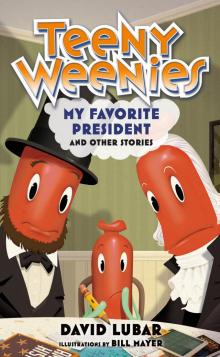 Teeny Weenies: My Favorite President
Teeny Weenies: My Favorite President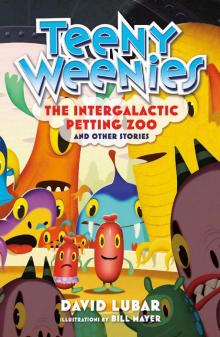 Teeny Weenies: The Intergalactic Petting Zoo
Teeny Weenies: The Intergalactic Petting Zoo Teeny Weenies: The Eighth Octopus
Teeny Weenies: The Eighth Octopus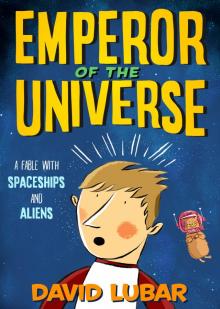 Emperor of the Universe
Emperor of the Universe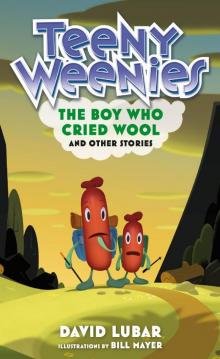 Teeny Weenies: The Boy Who Cried Wool
Teeny Weenies: The Boy Who Cried Wool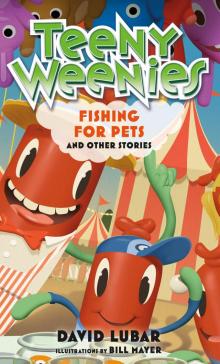 Teeny Weenies: Fishing for Pets
Teeny Weenies: Fishing for Pets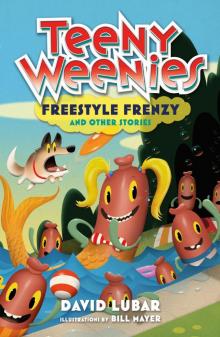 Teeny Weenies: Freestyle Frenzy
Teeny Weenies: Freestyle Frenzy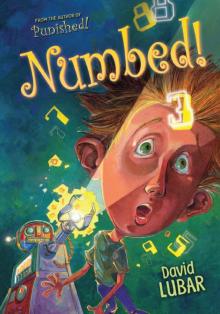 Numbed!
Numbed!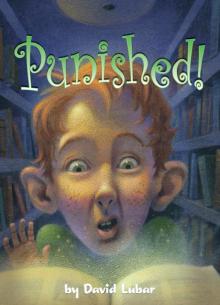 Punished!
Punished!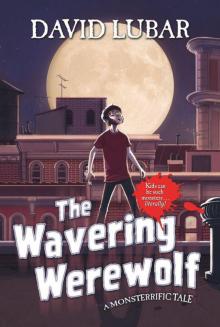 The Wavering Werewolf: A Monsterrific Tale (Monsterrific Tales)
The Wavering Werewolf: A Monsterrific Tale (Monsterrific Tales)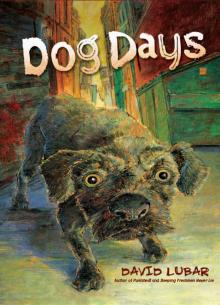 Dog Days
Dog Days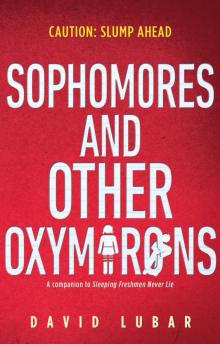 Sophomores and Other Oxymorons
Sophomores and Other Oxymorons The Psychozone
The Psychozone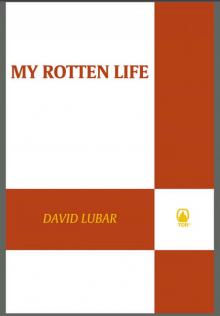 My Rotten Life
My Rotten Life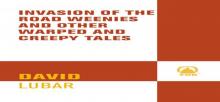 Invasion of the Road Weenies
Invasion of the Road Weenies In the Land of the Lawn Weenies
In the Land of the Lawn Weenies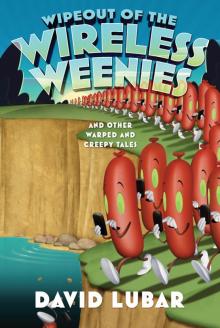 Wipeout of the Wireless Weenies
Wipeout of the Wireless Weenies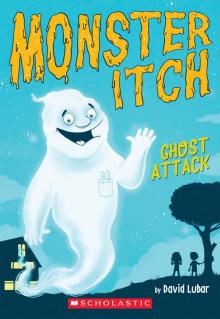 Ghost Attack
Ghost Attack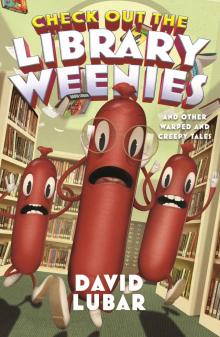 Check Out the Library Weenies
Check Out the Library Weenies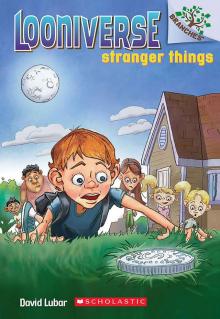 Looniverse #1: Stranger Things (A Branches Book)
Looniverse #1: Stranger Things (A Branches Book)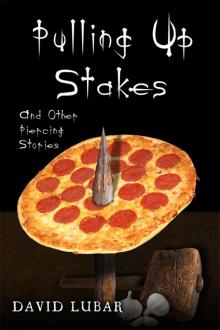 Pulling up Stakes and Other Piercing Stories
Pulling up Stakes and Other Piercing Stories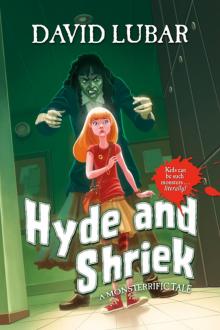 Hyde and Shriek
Hyde and Shriek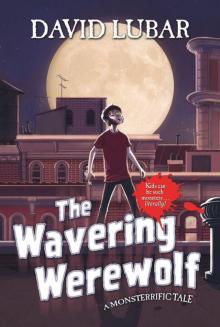 The Wavering Werewolf
The Wavering Werewolf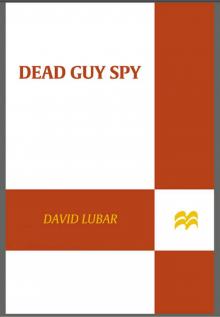 Dead Guy Spy
Dead Guy Spy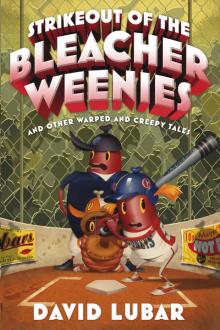 Strikeout of the Bleacher Weenies
Strikeout of the Bleacher Weenies The Big Stink
The Big Stink The Battle of the Red Hot Pepper Weenies
The Battle of the Red Hot Pepper Weenies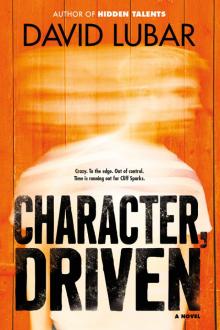 Character, Driven
Character, Driven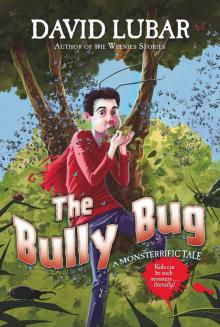 The Bully Bug
The Bully Bug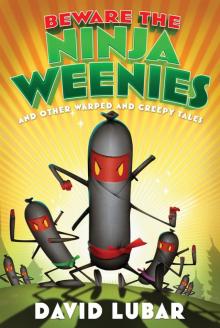 Beware the Ninja Weenies
Beware the Ninja Weenies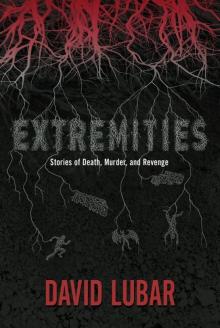 Extremities: Stories of Death, Murder, and Revenge
Extremities: Stories of Death, Murder, and Revenge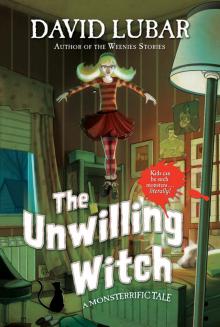 The Unwilling Witch
The Unwilling Witch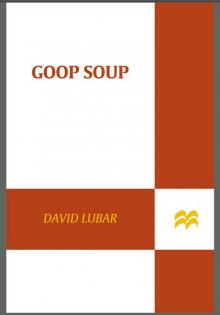 Goop Soup
Goop Soup Lay-ups and Long Shots
Lay-ups and Long Shots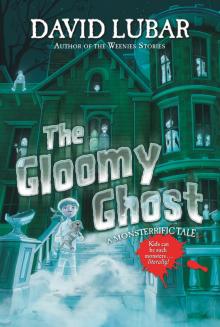 The Gloomy Ghost
The Gloomy Ghost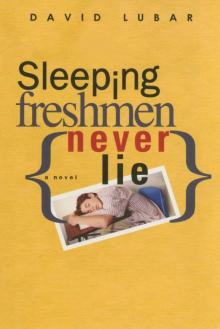 Sleeping Freshmen Never Lie
Sleeping Freshmen Never Lie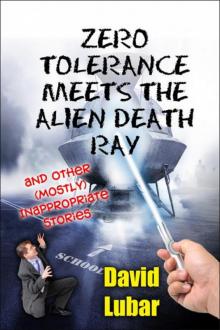 Zero Tolerance Meets the Alien Death Ray and Other (Mostly) Inappropriate Stories
Zero Tolerance Meets the Alien Death Ray and Other (Mostly) Inappropriate Stories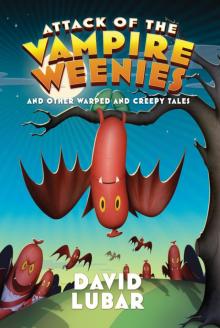 Attack of the Vampire Weenies
Attack of the Vampire Weenies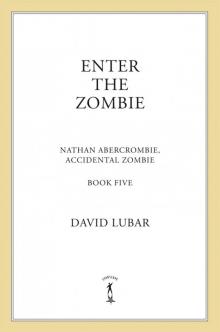 Enter the Zombie
Enter the Zombie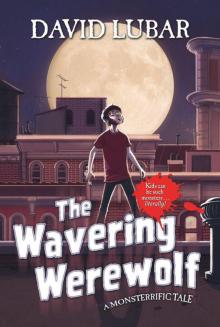 The Wavering Werewolf_A Monsterrific Tale
The Wavering Werewolf_A Monsterrific Tale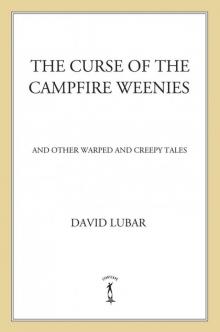 The Curse of the Campfire Weenies
The Curse of the Campfire Weenies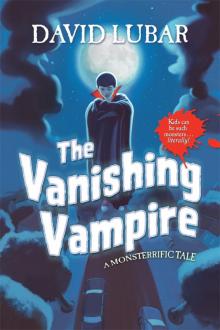 The Vanishing Vampire
The Vanishing Vampire